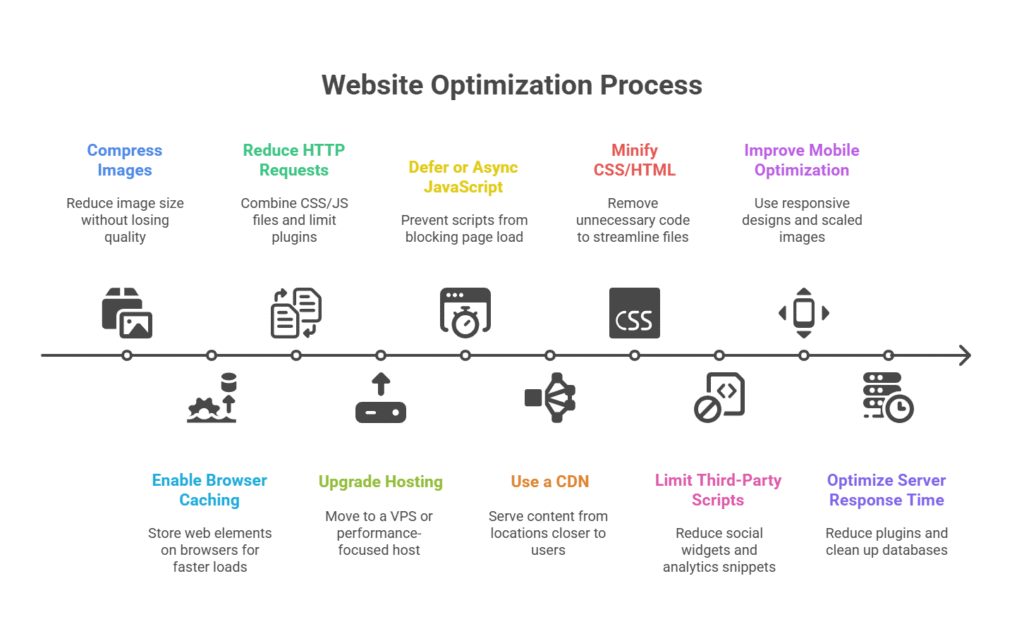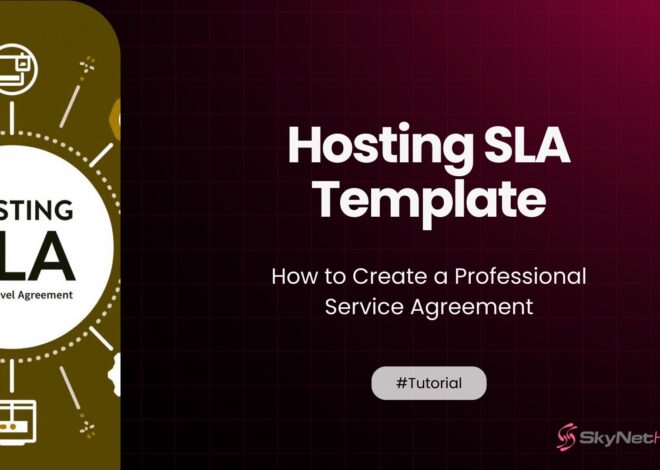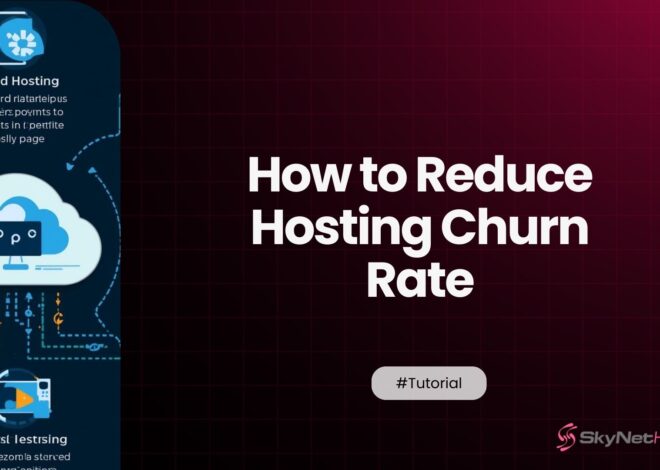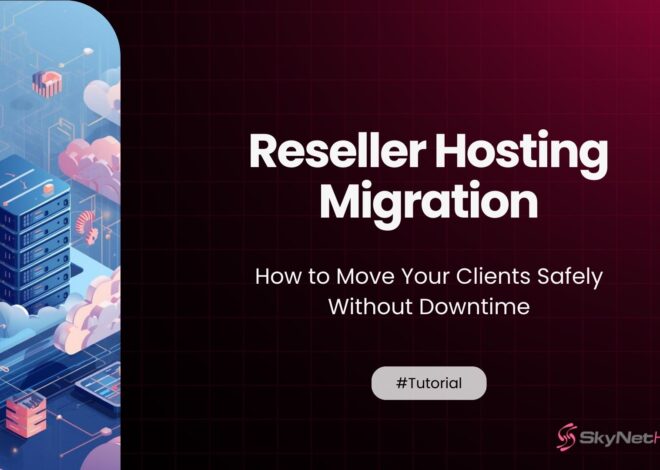
How to Fix Website Running Slow (No Tech Team Required)
TL;DR
- Over 53% of mobile users abandon slow sites; poor speed hurts traffic, conversions, SEO, and revenue.
- Top causes of slowness include unoptimized images, lack of browser caching, too many HTTP requests, shared hosting limits, and render-blocking scripts.
- Practical fixes: compress images, enable caching, combine resources, minimize plugins, defer nonessential scripts, and use a CDN for global delivery.
- Upgrading from shared hosting to a VPS or high-performance provider (like SkyNetHosting.Net) can dramatically improve load times and site reliability.
- Minify CSS/HTML, audit third-party scripts, and use mobile-first, lightweight themes for better Core Web Vitals and speed.
- Regular speed tests (GTmetrix, Pingdom, PageSpeed Insights), proper server maintenance, and strategic hosting choices are crucial for a fast, responsive website.
Did you know? Nearly 53% of mobile users abandon sites that take longer than 3 seconds to load, according to Google research. And with Google’s Core Web Vitals directly influencing your search rankings, a slow-loading website isn’t just frustrating, it’s costing you traffic, conversions, and revenue.
In today’s fast-paced world, website performance is critical. If you’ve been wondering How to fix website running slow, you’re not alone. Even without a technical background, you can address the most common issues that hold your site back.
Let’s dive into a true-to-life story that reflects a common struggle:
The Pain of a Slow Website: A Small Business Story
Meet Sandra. She runs a boutique online store selling eco friendly skincare products. Her Instagram is thriving, her marketing is on point, but her website? A nightmare.
Page load times averaged 6 to 8 seconds. Bounce rates soared. Ad costs increased. Despite doing everything else right, conversions tanked.
One night, desperate for solutions, Sandra searched, “How to fix website running slow?” That search led her to a few free tools, simple changes, and ultimately turned her online store around:
After a weekend of research, a few free tools, and small changes, she turned things around:
- Load time dropped to 2.2 seconds
- Bounce rate fell by 42%
- Conversion rate increased by 30%
Sandra discovered the same 10 core issues, and how to fix website running slow for good.
Top 10 Reasons Why Websites Are Slow (and How to Fix Website Running Slow)

1. Unoptimized Images Are Eating Up Bandwidth – How to optimize images for faster loading
Problem: Large, uncompressed images are a major cause of sluggish site speeds.
Fix: Use free tools like TinyPNG or plugins like ShortPixel to compress images. Implement responsive image sizes with modern formats like WebP.
2. No Browser Caching – “How to reduce server response time without a developer”
Problem: Without caching, returning visitors must reload every single element.
Fix: Activate browser caching in your CMS (e.g., in WordPress, go to Settings > Caching, or install a plugin like W3 Total Cache). If you manage your hosting panel, look under File Manager or .htaccess configuration.
3. Too Many HTTP Requests – Excessive server calls, too many files loading
Problem: Each image, script, or stylesheet creates a new request, slowing down load times.
Fix: Combine CSS/JS files where possible, limit plugins, and use tools like GTmetrix to analyze request counts.
4. Shared Hosting Limitations – Fix slow website performance on shared hosting
Problem: Budget hosting means shared resources. A traffic spike on another site can slow yours down.
Fix: Upgrade to a VPS or consider a performance-focused provider. SkyNetHosting.Net , for example, offers SSD powered servers, low-latency network architecture, and free performance tuning assistance, making it ideal for small businesses wanting more speed without tech headaches.
5. Render-Blocking JavaScript
Problem: Some JavaScript runs before the page finishes loading.
Fix: Use async/defer attributes to delay script execution. With WordPress, try plugins like Async JavaScript. Move non critical scripts to the footer for faster loading.
6. No Content Delivery Network (CDN) – How to speed up my WordPress site without coding
Problem: Visitors far from your server experience longer load times.
Fix: Use a CDN like Cloudflare, BunnyCDN, or Amazon CloudFront to deliver your content from a location closer to the user.
7. Inefficient CSS and HTML – Poorly minified code, bloated HTML markup
Problem: Bloated or outdated code increases load times.
Fix: Minify your CSS/HTML using tools like MinifyCode, or install plugins that automate this like Autoptimize.
8. Third Party Scripts ( Heavy third-party scripts )
Problem: Social widgets, ads, and tracking scripts can slow performance.
Fix: Audit external scripts with PageSpeed Insights and remove or defer any that are not essential.
9. Poor Mobile Optimization( Improve Core Web Vitals for small business websites)
Problem: Many sites look fine on desktop but crawl on mobile.
Fix: Choose a responsive, mobile-first theme. Optimize images for smaller screens and test your mobile performance using Lighthouse.
10. Slow Server Response Time (TTFB) – What causes high Time to First Byte (TTFB)
Problem: Time To First Byte (TTFB) measures how quickly your server starts responding.
Fix: Reduce plugin bloat, optimize your database, and if issues persist , switch to a high-performance provider like Skynet Hosting, which specializes in low-TTFB infrastructure with PHP 8.x and LiteSpeed caching support.
🔧 Tools to Test and Fix Your Site
❓ Frequently Asked Questions (FAQ)
⚡ Website Speed & Performance – FAQ
Slow website? Fast internet but pages still lag? These are common problems for small business owners and web developers. Below are real questions people search on Google or ask tools like ChatGPT. Use these answers to fix website speed, improve SEO, and deliver a better experience.
❓ How do I fix a slow website speed?
Start with these steps:
- ✅ Compress images
- ✅ Enable browser caching
- ✅ Minimize plugins
- ✅ Use speed test tools like GTmetrix and PageSpeed Insights
Advanced fixes:
- Limit HTTP requests
- Minify CSS, HTML & JavaScript
- Remove render-blocking code
- Use fewer redirects
- Choose reliable third-party services
- Host your site on a fast provider
❓ Why is my HTML website laggy?
Even a basic HTML site can be slow if:
- Images are too large
- Inline code is excessive
- JavaScript isn’t optimized
- You’re using poor hosting
- Scripts aren’t compressed or minified
Fix this by optimizing code, using a CDN, and choosing a better hosting provider.
❓ How can I increase my website speed?
Here’s how to speed things up:
- Use a lightweight theme.
- Compress all images.
- Minify CSS and JS files.
- Eliminate render-blocking resources.
- Combine files to reduce HTTP requests.
- Choose a fast host like SkyNetHosting.Net
❓ Why do websites load slowly?
Top reasons include:
- Large media files.
- Too many server requests.
- Poor hosting.
- No caching or CDN.
- Outdated or messy code.
- Too many scripts running
- Also, network congestion at home or the office can impact performance.
❓ Why are websites loading slow but internet is fast?
If your internet is working fine but websites load slowly, it’s likely a problem on the website’s side, not yours.
Tips:
- Update your browser.
Close extra tabs. - Clear cache and cookies.
- Manage extensions.
- Check for malware.
- Use a lightweight browser.
- Upgrade your hosting.
❓ Website speed test , How can I test my site?
Use these free tools to check your site speed:
- GTmetrix.
- Pingdom.
- Google PageSpeed Insights.
These tools help you identify and fix speed issues.
❓ Browser takes too long to load a page – what can I do?
This might be caused by:
- DNS delays.
- Unoptimized scripts.
- Caching issues.
Fix it by:
- Clearing browser cache.
- Checking DNS settings.
- Testing server performance.
❓ Why is my internet speed so slow?
Your internet could be slow due to:
- Too much distance from your router.
- Old drivers or devices.
- Too many apps running.
- Malware.
- Network congestion
Try restarting your router, updating drivers, or scanning for malware.
❓ How do I clear my cache in Chrome?
- Open Chrome.
- Click the 3 dots in the top-right corner.
- Go to More Tools > Clear Browsing Data.
- Choose a time range (e.g. “All time”).
- Select Cache and Cookies.
- Click Delete data.
This helps fix loading issues and can speed up your browser.
🚀 Take the First Step Toward a Faster Website
If your site feels sluggish and you’ve been wondering how to fix website running slow, remember Sandra’s story: she didn’t need a tech team, just the right checklist and tools.
You can speed up your website, positively impact SEO, and deliver a noticeably better user experience by following the guidance above.
Ready for lightning-fast performance, premium support, and growth-focused hosting? Choose SkyNetHosting.Net for proven results and an end to slow website headaches.
FAQs
What are common causes of a slow website?
Unoptimized images, lacking browser caching, too many HTTP requests, shared hosting resource limits, render-blocking JavaScript, no CDN usage, inefficient CSS/HTML, heavy third-party scripts, poor mobile optimization, and slow server response times can all slow down your site.
How can I optimize images to speed up my site?
Why does browser caching improve website performance?
Are hosting limits a reason for website slowness?
What is a CDN and how does it help loading speed?
How does render-blocking JavaScript affect speed, and how can I fix it?
What tools can test and help fix website speed?
Free tools like GTmetrix, Pingdom, and Google PageSpeed Insights analyze site speed and diagnose performance bottlenecks. They offer actionable recommendations for compressing images, reducing requests, optimizing code, and upgrading hosting to fix slow load times.



